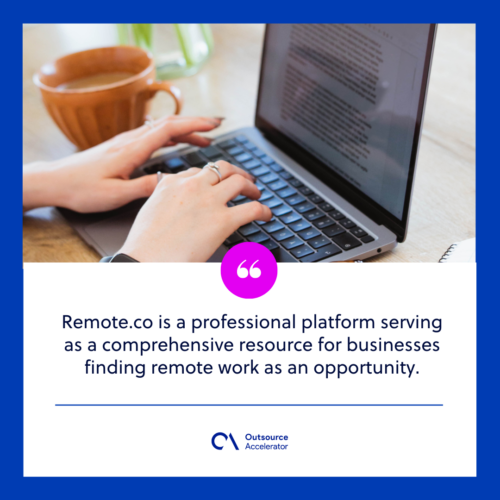Remote Professionals: Your Guide to Flexible Work Options
Remote Professionals: Your Guide to Flexible Work Options
Blog Article
Exactly How to Construct an Effective Team of Remote Professionals
In today's progressively electronic landscape, the capacity to construct a successful group of remote specialists is essential for companies intending to thrive. It is the subtler elements-- like nurturing a cohesive business culture and advertising continual learning-- that can truly establish a remote group apart.
Specify Clear Objectives and Assumptions
Regularly developing clear goals and assumptions is crucial for the success of a remote group (Remote Professionals). Without these elements, staff member may experience complication concerning their duties, responsibilities, and the total purposes of the task. This ambiguity can bring about lowered efficiency, misaligned efforts, and ultimately, project failure
To define clear objectives, it is vital to employ the wise standards-- Details, Quantifiable, Attainable, Pertinent, and Time-bound. This strategy makes certain that each objective is well-defined and can be effectively communicated to all staff member. Moreover, it is vital to line up individual objectives with the overarching vision of the company, fostering a feeling of objective and dedication among team participants.

Foster Effective Communication

Regular check-ins and team conferences can help keep a strong communication flow, allowing participants to share progress updates and review any type of obstacles they might experience. It is also important to recognize that different people might have differing communication designs. Recognizing and fitting these distinctions can result in more meaningful communications and an extra cohesive group dynamic.
Moreover, clearness is essential in all types of interaction, whether written or spoken. When needed, urge group members to articulate their ideas succinctly and to look for explanation. This approach lessens misconceptions and makes sure that everybody gets on the same page. By prioritizing reliable communication, remote teams can improve efficiency, enhance connections, and develop an extra comprehensive job atmosphere, ultimately resulting in greater success in accomplishing usual goals.

Utilize the Right Tools
To sustain efficient communication within a remote team, it is very important to utilize the right devices that facilitate cooperation and streamline process. The choice of tools can dramatically impact efficiency, making certain that team members continue to be connected and engaged despite geographical distances.
Begin by applying job monitoring software program, such as Trello or Asana, to arrange jobs, established due dates, and track development. This cultivates responsibility and offers exposure right into each member's contributions. Furthermore, communication platforms like Slack or Microsoft Teams use instantaneous messaging capabilities, making it possible for real-time conversations and fast decision-making.
Video clip conferencing devices, such as Zoom or Google Meet, are important for face-to-face communications, which help build rapport and enhance relationships amongst staff member. Paper sharing and storage remedies like Google Drive or Dropbox make certain that vital documents are editable and easily accessible by all team members, advertising cooperation on tasks.
Incorporating these devices successfully produces an atmosphere where remote professionals can grow. By picking the ideal innovation, organizations can enhance interaction, boost task administration, and eventually achieve their objectives more effectively.
Build a Solid Business Culture
Creating a solid business society within a remote team is crucial for promoting engagement and commitment amongst staff members. A distinct culture provides a sense of belonging and shared purpose, which is critical when staff member are spread across numerous places. To cultivate this society, leaders ought to develop clear values and assumptions that resonate with employees, making certain that everyone recognizes the mission and vision of the organization.
Normal interaction is vital in strengthening this society. Using video clip calls, group meetings, and casual check-ins can aid advertise and maintain links openness. Additionally, celebrating achievements, both huge and tiny, reinforces a society of recognition and recognition.
Urging group cooperation via virtual platforms not only improves efficiency but likewise cultivates social relationships - Remote Professionals. Organizing online team-building activities can even more enhance bonds amongst employee, making them feel a lot more incorporated right into the firm
Last but not least, it is essential to listen to employee comments and adapt as needed. By showing that their voices issue, leaders can build trust and loyalty, ultimately producing a flourishing remote workplace where employees really feel valued and engaged.
Motivate Continuous Understanding and Advancement
A strong business culture lays the groundwork for motivating continuous learning and development within a remote group. By fostering an environment that values development, organizations can equip workers to improve their skills, adapt to new difficulties, and eventually contribute better to group objectives.
To promote continual find more understanding, take into consideration carrying out normal training sessions, workshops, and webinars that align with both specific job objectives and organizational needs. Utilize technology to promote accessibility to e-learning platforms, ensuring that sources are easily available for remote staff member.
Motivate knowledge sharing by developing mentorship programs and creating discussion forums for workers to exchange understandings and finest techniques. Awarding and recognizing employee who proactively page engage in finding out efforts reinforces the relevance of growth and inspires others to adhere to fit.
Moreover, carrying out routine comments sessions can help recognize skill spaces and areas for improvement, enabling customized advancement strategies. By prioritizing constant discovering and development, remote groups can grow a culture of technology, adaptability, and resilience, which are vital for browsing the complexities of today's service landscape.
Final Thought
In conclusion, the establishment of an effective remote group rests on the assimilation of clear objectives, efficient interaction, ideal devices, a durable company culture, and continuous knowing chances. By lining up specific payments with business goals and fostering an atmosphere of openness and partnership, remote experts can prosper. Remote Professionals. The implementation of these methods not just boosts group communication however additionally drives motivation, eventually resulting in enhanced performance and success in a remote working landscape
It is the subtler aspects-- like supporting a cohesive company culture and promoting continual understanding-- that can absolutely set a remote team apart.Effective interaction is the see post keystone of a growing remote group. By focusing on reliable interaction, remote groups can improve efficiency, strengthen connections, and produce a more inclusive work environment, inevitably leading to greater success in accomplishing common objectives.
Producing a strong company culture within a remote group is vital for promoting engagement and commitment among employees.In conclusion, the establishment of an effective remote group hinges on the assimilation of clear goals, efficient interaction, suitable tools, a durable company society, and constant learning opportunities.
Report this page